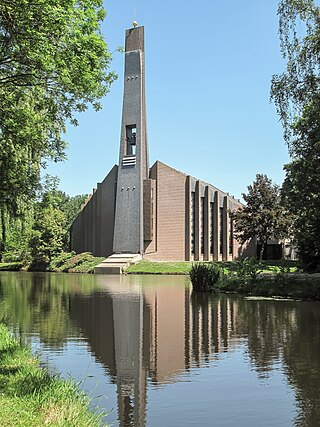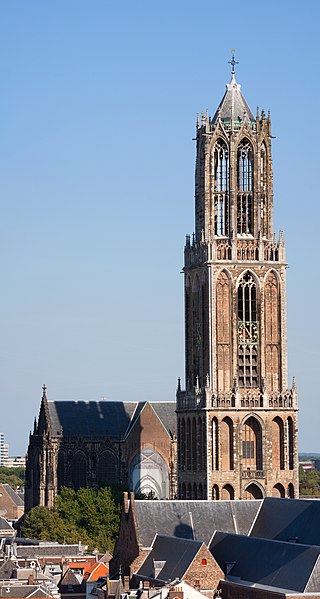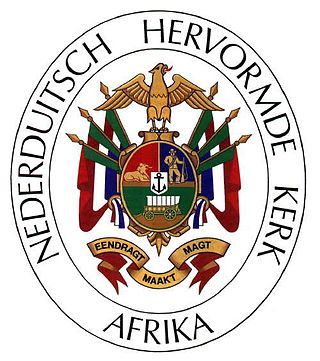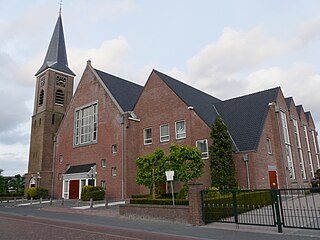Related Research Articles
The Protestant Church in the Netherlands is the largest Protestant denomination in the Netherlands, being both Calvinist and Lutheran.

Afrikaner Calvinism is a cultural and religious development among Afrikaners that combined elements of seventeenth-century Calvinist doctrine with a "chosen people" ideology based in the Bible. It had origins in ideas espoused in the Old Testament of the Jews as the chosen people.
The Dutch Reformed Church was the largest Christian denomination in the Netherlands from the onset of the Protestant Reformation in the 16th century until 1930. It was the original denomination of the Dutch royal family and the foremost Protestant denomination until 2004. It was the larger of the two major Reformed denominations, after the Reformed Churches in the Netherlands was founded in 1892. It spread to the United States, South Africa, Indonesia, Sri Lanka, Brazil, and various other world regions through Dutch colonization. Allegiance to the Dutch Reformed Church was a common feature among Dutch immigrant communities around the world and became a crucial part of Afrikaner nationalism in South Africa.
The Reformed Ecumenical Council (REC) was an international organization of Calvinist churches. It had 39 member denominations from 25 countries in its membership, and those churches have about 12 million people together. It was founded August 14, 1946 in Grand Rapids, Michigan as the Reformed Ecumenical Synod. The Reformed Ecumenical Council was the second largest international Calvinist alliance and the more conservative of the two largest. In 1953, The Reformed Ecumenical Synod meeting in Edinburgh decided to advise its member churches not to join the World Council of Churches as currently constituted because it “permits essentially different interpretations of its doctrinal basis, and thus the nature of the Christian faith” and “represents itself as a Community of faith, but is actually not this” due to member churches holding “basically divergent positions.”

The Reformed Churches in the Netherlands was the second largest Protestant church in the Netherlands and one of the two major Calvinist denominations along with the Dutch Reformed Church since 1892 until being merged into the Protestant Church in the Netherlands (PKN) in 2004. The PKN is the continuation of the Dutch Reformed Church, the Reformed Churches in the Netherlands and the Evangelical-Lutheran Church in the Kingdom of the Netherlands.

Protestant Theological University is a theological university with locations in two Dutch cities: Amsterdam and Groningen. The Protestant Theological University primarily caters for ministerial education and as such is one of three institutes recognised by the PKN, but it is also possible to study general (Calvinist) theology without wishing to become a minister.

Yerseke is a village situated on the southern shore of the Oosterschelde estuary in the Dutch province of Zeeland. A separate municipality until 1970, it today forms part of the municipality of Reimerswaal. As of 2010 Yerseke had a recorded population of 6,695 inhabitants, living in 2,680 households.

The Christian Reformed Churches in the Netherlands is a Protestant church in the Netherlands.

Nieuwerkerk is a village in the Dutch province of Zeeland. It is a part of the municipality of Schouwen-Duiveland, and lies about 23 km south of Hellevoetsluis.

Religion in the Netherlands was historically dominated by Christianity between the 10th and 20th centuries. In the late 19th century, roughly 60% of the population was Calvinist and 35% was Catholic. Since then, there has been a significant decline in both Catholic and Protestant Christianity, with Protestantism declining to such a degree that Catholicism became the foremost form of the Christian religion. The majority of the Dutch population is secular. Relatively sizable Muslim and Hindu minorities also exist.

The World Communion of Reformed Churches (WCRC) is the largest association of Reformed (Calvinist) churches in the world. It has 230 member denominations in 108 countries, together claiming an estimated 80 million people, thus being the fourth-largest Christian communion in the world after the Catholic Church, Eastern Orthodox Church, and the Anglican Communion. This ecumenical Christian body was formed in June 2010 by the union of the World Alliance of Reformed Churches (WARC) and the Reformed Ecumenical Council (REC).

Garderen is a village in the Dutch province of Gelderland. It is located in the municipality of Barneveld, in the forests of the Veluwe. The village has 1,994 inhabitants.

Protestantism in South Africa accounted for 73.2% of the population in 2010. Approximately 81% of South Africans are Christian and 5 out of 6 Christians are Protestant. Later censuses do not ask for citizens’ religious affiliations. Estimates in 2017 suggested that 62.5% of the population are Protestant.

The Dutch Reformed Church in Africa is a Reformed Christian denomination based in South Africa. It also has congregations in Namibia, Botswana, Zambia and Zimbabwe. Along with the Dutch Reformed Church in South Africa (NGK) and the Reformed Churches in South Africa, the NHKA is one of the three Dutch Reformed sister churches of South Africa. The NHKA retains the old Nomenclature Nederduitsch, the word originally referring to the Dutch language. The word refers to the Low Saxon language today. The Dutch language remained the official language of the church until 1933 when the church started functioning almost exclusively in Afrikaans.

The Restored Reformed Church is a Calvinist denomination in the Netherlands. It was founded in 2004, from congregations which made up the orthodox-reformed wing of the Dutch Reformed Church; they had previously been part of groups named Het Gekrookte Riet and the still existing Gereformeerde Bond within the Dutch Reformed Church. The Church has grown steadily since its founding.
The 1886 Dutch Reformed Church split, also known as the Doleantie, was the name of a prominent schism in the Dutch Reformed Church that took place in 1886 and was led by a renowned minister, Abraham Kuyper. The Doleantie was not the first schism in the Dutch Reformed Church. Another schism, the Secession of 1834 (Afscheiding van 1834), had led to the formation of the Christian Reformed Church in the Netherlands (Christelijke Gereformeerde Kerk in Nederland).

The Reformed Congregations is a conservative Reformed church with 152 congregations in the Netherlands, 1 in Randburg, South Africa and 1 congregation in Carterton, New Zealand. The denomination has approximately 107,299 members as of 1 January 2015. It is Calvinist in theology. It is affiliated with the North American Netherlands Reformed Congregations.
The Pasundan Christian Church was officially established in Indonesia on 14 November 1934. It has 51 congregations and 33,000 members. It is a member of the World Communion of Reformed Churches (WCRC).

The Afrikaanse Protestantse Kerk, also known as AP Kerk, is a South African conservative Reformed Church federation with about 35,000 adherents. The federation consists of 210-240 congregations, mostly in South Africa, although the APK also includes 7 congregations in Namibia and one in London, England.
Jan van der Graaf was a Dutch church administrator and engineer. He was General Secretary of the Reformed Association in the Dutch Reformed Church between 1973 and 2000. Van der Graaf also wrote several books, was chief editor of the Reformed Association's magazine De Waarheidsvriend and associated with the Evangelische Omroep.
References
- ↑ "www.historici.nl". Archived from the original on 2012-08-06. Retrieved 2013-06-02.
- ↑ "Geschiedenis". Archived from the original on 2022-10-15. Retrieved 2022-10-15.
- ↑ filosofie, Van onze redactie religie en (September 9, 2011). "Gematigde midden overheerst in PKN". Trouw. Retrieved October 15, 2022.